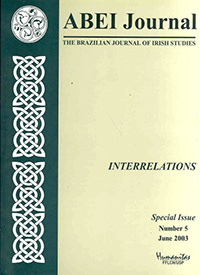Cage and Joyce
DOI:
https://doi.org/10.37389/abei.v5i1.182333Keywords:
James Joyce, John Cage, Irish literature, music, poetryAbstract
James Joyce’s work was very important to the development of John Cage’s music and poetry. We can see it when we listen to his compositions or read his poems. Cage admired Joyce’s last novel, Finnegans Wake, praising mainly its language and circular structure. Cage decided to rewrite this novel, using a very personal method, that he called “chance operations”.Why did Cage decide to do it? I do not intend to explain his innermost motivations, but it is obvious that Cage created a very interesting poem, “Writing through Finnegans Wake”, that could be considered a very condensed version of Joyce’s masterpiece. After finishing his poem, Cage decided to transform it into a musical piece. He collected a great variety of sounds, using Joyce’s novel as a guide. So all the sounds that Cage collected are mentioned in Finnegans Wake – noises, voices, traditional songs, etc. All these sounds were played together, creating a sonorous chaos that suggests a dream, the dream of all mankind. Its title is taken from Finnegans Wake: “Roaratorio”. This musical composition is in its own right a masterpiece. Cage’s voice, reading his own poem, was added to this musical chaos.This composition was recorded and today is available on CD. I would like to play a small fragment of it. But before doing so, I would like to call attention to Cage’s poem, because it reveals Cage’s poetics very well.Cage loved Joyce’s words, but criticized his syntax, because it looked like the normal syntax of the English language. For this reason Cage decided to use words without normal syntax, creating a new kind of poetic language not found in Joyce’s novel.
References
Cage, John. “Empty Words”, Hanover, Wesleyan University Press, 1981.
____. “Roaratorio” (two cds and program notes enclosed: Conversation on Roaratorio). New York:
Mode, 1992.
Hayman, David and Elliott Anderson. “In the Wake of the ‘Wake’”. Madison: The University of
Wisconsin Press, 1978.
Karolyi, Otto. “Introducing Modern Music”, London: Penguin Books, 1995.
Kostelanetz, Richard. “John Cage (ex)plain(ed)”. New York: Schirmer Books, 1996.
Pritchett, James. “The Music of John Cage”. Cambridge: Cambridge University Press, 1996.
Revill, David. “The Roaring Silence”. New York: Arcade Publishing, 1992.
Downloads
Published
Issue
Section
License
Copyright (c) 2003 Sérgio Medeiros

This work is licensed under a Creative Commons Attribution-NonCommercial 4.0 International License.


